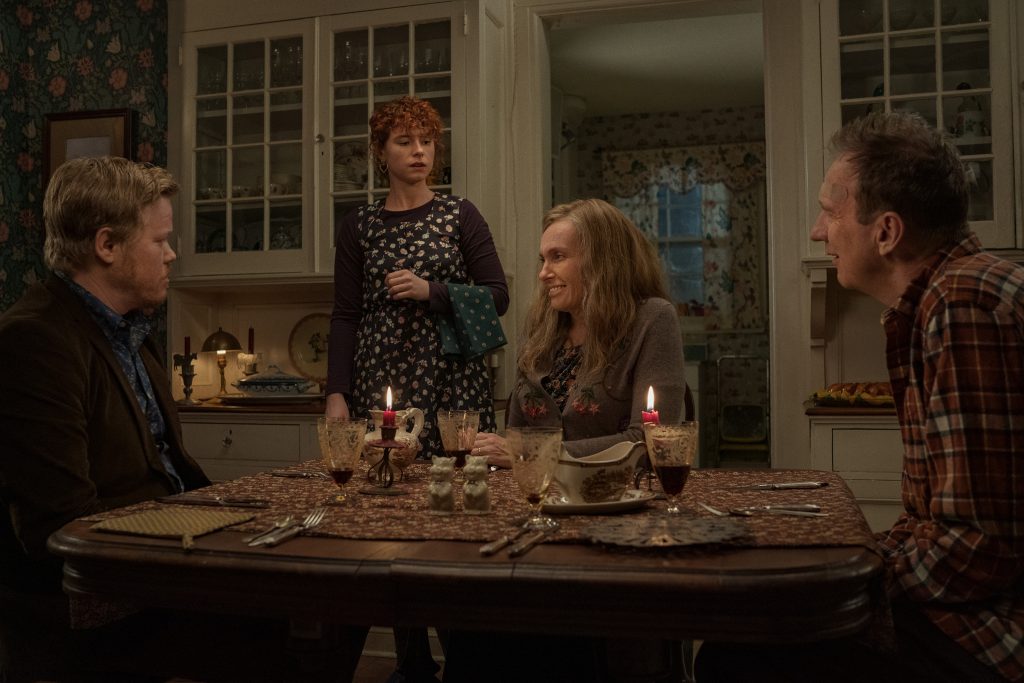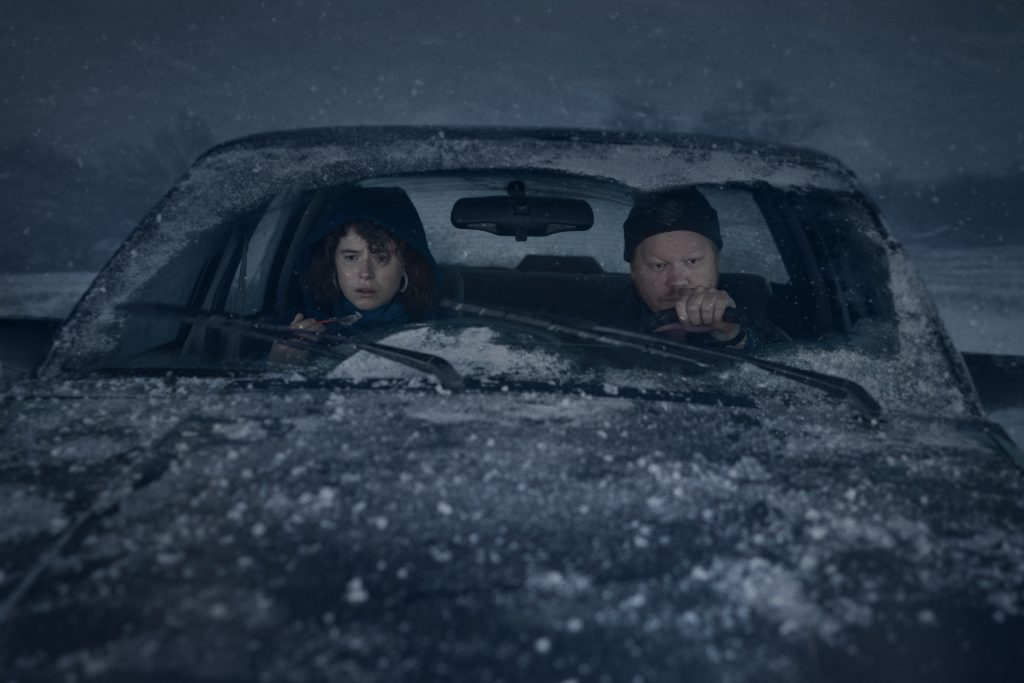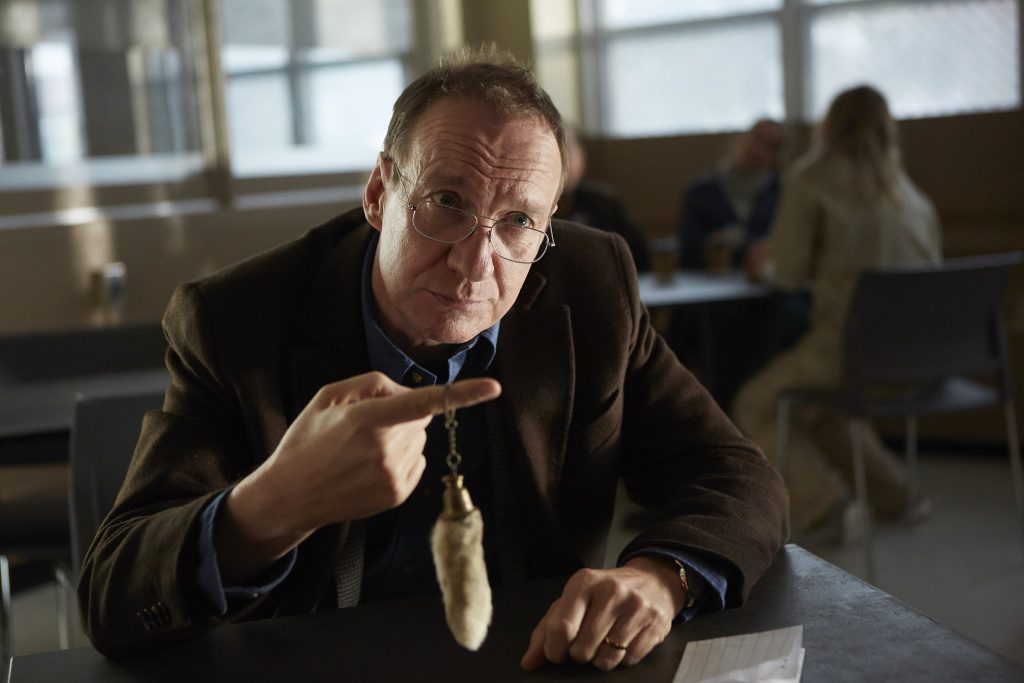September 4, 2021
by Carla Hay

Directed by Billie Piper
Culture Representation: Taking place in London and in the Spanish city of Girona, the dark comedy film “Rare Beasts” features a predominantly white cast of characters (with a few black people) representing the working-class and middle-class.
Culture Clash: A single mother in London navigates her way through the dating scene and family relationships with cynicism and hope.
Culture Audience: “Rare Beasts” will appeal primarily to people who can tolerate foul-mouthed and offbeat comedy about love and romance.

“Rare Beasts” tries a little too hard to be the opposite of a typical romantic comedy, but its brazen and often-vulgar attempts at being original end up working well for the story, more often than not. The movie is a memorable showcase for Billie Piper, who is the writer, director and star of “Rare Beasts,” which offers a deeply jaded and brash take on love, dating and family relationships. The tone and language of the movie can be very off-putting to people who want safer and more conventional romantic comedies. But for viewers who are a little more adventurous and who don’t mind watching very unhappy people trying to find love any way that they can (even if the love is all wrong for them), then “Rare Beasts” is a deliberately squirm-inducing ride.
In “Rare Beasts” (which is Piper’s feature-film directorial debut), Piper obliterates the notion that comedic heroines who are looking for love have to be perky and plucky people-pleasers. Piper’s Mandy character, who lives in London, is depressive and often rude. Mandy vacillates between wanting to be independent and wanting to admit she’s looking for a man help her feel more fulfilled. She doesn’t think that “feminism” is a dirty word, but she also thinks that feminism shouldn’t mean that men and women don’t need each other.
Mandy is a single mother to a son named Larch (played by Toby Woolf), who’s about 6 or 7 years old. He’s an eccentric loner child with some emotional issues because he’s prone to randomly throw temper tantrums. The movie infers that Larch is somewhere on the autistic spectrum. Mandy adores Larch, but because she’s not a typical rom-com single mother, she sometimes acts as if she’s embarrassed or burdened by being a single mother because her parental responsibilities can get in the way of her love life. Larch’s father (who is shown briefly later in the movie) is an ex-lover who is not involved in raising Larch because Mandy never told this man that Larch is his son.
The opening scene of “Rare Beasts” sets the tone of what type of movie it is, because almost all the adult main characters in the movie are so forthright with their crassness. Some might call it “brutal honesty,” while others might call it “diarrhea of the mouth.” In this opening scene, Mandy is on a first date with a bespectacled misogynist named Pete (played by Leo Bill), who reveals a lot of his insecurities while Pete and Mandy (who are both in their late 30s) have dinner at a restaurant.
Pete begins his rant by saying, “I find women, in the main, intolerable. But I realize that I can’t live without them. My parents—it’s hard to find a love like that.” Viewers later find out that Pete’s parents have been married for about 45 years. Pete and his family have very conservative and traditional views of love and marriage, including believing that the man should always be the dominant partner in heterosexual relationships.
Right from the start, viewers know that Pete and Mandy will be a mismatch for each other. Pete mentions that he’s very religious, while Mandy says that she’s an atheist. Mandy also tells him on this first date: “In the spirit of honesty, Pete, you should know I give really bad blowjobs.” Then they talk about the use of teeth and gums during oral sex. Mandy says sarcastically, “Do you want teeth by day, gums by night?”
Pete then complains about modern, assertive women by saying, “You’ve got more testosterone running in your veins than blood!” Mandy is alarmed (or is amused?) by Pete’s blantant sexism and replies, “You’re going to rape me, aren’t you? Those are classic rapist remarks.”
The date ends shortly after this thorny conversation. While waiting for a taxi outside the restaurant, Mandy vomits on the street. Even though this date is a disaster, Pete says to Mandy: “You’ll marry me in a year.”
And just as you might expect in a comedy that aims to upend people’s assumptions, Mandy and Pete begin dating each other. And how’s this for potentially messy? Pete and Mandy work together. They’re both screenwriters for an unnamed TV series.
Viewers might be asking themselves, “What are these two people thinking by going into a train-wreck relationship? Are Mandy and Pete that lonely and desperate?” As the unlikely romance between Mandy and Pete continues, the answer is: “Yes, people can make bad relationship choices when they’re lonely and desperate.” You don’t need a movie to show it, because there are many examples of it in real life.
Essentially, Pete is up front from the start that he’s on the hunt for a dutiful wife. Mandy has gotten tired of being a single parent and wonders if her son would be better off if he had a father figure to help Mandy in raising Larch. Mandy and Pete both came along in each other’s lives when they felt they didn’t have any better options for a love partner. And now they’re in a relationship that could lead to marriage. Pete and Mandy predictably argue, because their core values are so fundamentally different from each other.
There are other big reasons why Mandy is in this relationship with Pete, but she doesn’t say it out loud. However, it’s all on display in the movie. First, her mother Marion (played by Kerry Fox), who’s a bitter, chain-smoking divorcée, lives with Mandy and Larch in a very cramped house. It’s obvious from Mandy and Marion’s interactions with each other that they have a love/hate relationship. Mandy is probably thinking that getting married would be the perfect reason to force her mother to live elsewhere, without Mandy being the “villain” to kick her mother out of the house.
Secondly, Mandy is unhappy in her job, which is a male-dominated company called Woo Productions. The details of the TV show she writes for are never really made clear in this movie. But based on conversations, it’s a TV show about women, and it has a mostly female audience. However, the people who run the show are men.
It’s implied that Pete makes a lot more money than Mandy in this job, although they both seem to have the same or similar job titles and duties. It’s probably gone through Mandy’s head more than a few times how she can afford to leave this job that she hates when she is the only breadwinner for her household. (Mandy’s mother Marion is retired. )The fact of the matter is that many people consider a partner’s income as one of many important reasons to get married to that person. Pretending that people don’t think this way is like living in a fantasy world.
Mandy’s boss is a sexist American named Leonardo (played by Trevor White), who gives this type of critique about how she writes screenplays: “Nobody wants to read about miserable women, because they don’t exist.” He also scolds and warns Mandy by saying that she could be close to getting fired: “No more late arrivals, no more sad women, no more miserable conduct.” Meanwhile, it’s shown that Pete can be late for a staff meeting, and he doesn’t get reprimanded by the boss.
In staff meetings, Mandy and her few female co-workers are frequently talked over and treated dismissively by their male co-workers, who think they know better than the women about how women think, feel and act. The disagreements sometimes spill over into arguments between the men and women, but since they all have a sexist male boss at this company, it’s easy to know whose side he takes in these arguments. In real life, Piper has been a star and an executive producer for the female-oriented TV series “The Secret Diary of a Call Girl” (which was on the air from 2007 to 2011) and “I Hate Suzie” (which debuted in 2020), so she knows more than a few things about the gender dynamics of TV creatives behind the scenes.
Underneath the crude conversations that many of the characters have in the movie is some snarky social commentary about women’s self-esteem and how—like it or not—many people in society place a woman’s worth on her marital status or who she’s dating. Mandy’s mother Marion is the type of outspoken, “no filter” person to blurt out to Mandy when they talk about their sex lives: “I’ve never used a condom!” Mandy’s sarcastic reply: “You should probably get tested.” And yet, Marion is still treated like a selfish homewrecker by her ex-husband Vic (played by David Thewlis) because Marion wanted to end their miserable marriage. Vic is an alcoholic who cheated on Marion when they were married.
During parts of the movie, Vic (who lives alone) tries to convince Marion to move back in with him, even though their marriage has been over for six years. Vic alternately tries to put Marion on a guilt trip and gives her phony flattery, by saying that living with him again is the least she can to do help him live longer because she’s better at certain domestic duties (such as cooking and cleaning) than he is. He even goes as far to suggest to Marion that it’s not a good look to be a woman of a certain age who isn’t living with a man. It’s pathetic emotional manipulation that doesn’t work. Marion and Mandy might not always have the best relationship, but they both agree that Vic is too toxic to really trust.
During the course of the movie, there are some “Greek chorus” type scenes of female passersby on the street who chant self-affirming mantras out loud, as if Mandy (and the viewers by extension) can hear their thoughts. It’s the movie’s way of saying that everyday people are wracked with insecurities, but women have to work harder to overcome self-doubt because men are more likely than women to be rewarded for being confident. Later in the movie, during a pivotal scene, Mandy has a soul-baring monologue on the street, and several female strangers congregate and react to what Mandy says.
“Rare Beasts” pokes fun at two rom-com clichés involving a couple who’s dating: the “meet the parents/family” scenario and the “guests at a wedding” scenario. Mandy meets Pete’s family (his parents and three sisters) over a predictably awkward dinner at the parents’ house. During this dinner, one of Pete’s secrets is revealed, and he shows a very nasty side to himself when he lashes out in anger. This scene also re-affirms that Mandy would not fit in well with this very religious and conservative family.
The wedding scene, which takes place in Spain, is more amusing. Pete’s family is a friend of the bride. The bride Cressida (played by Lily James) and the groom Woody (played by Jolyon Coy) are a blissfully happy but shallow couple. (James shares top billing in “Rare Beasts,” but she’s only in the movie for less than 10 minutes.) When Woody is introduced to Pete, Woody says to Mandy, “I hope his penis is as big as his heart!” Meanwhile, Cressida is preoccupied with how the wedding photos will look, and she describes her relationship with Woody as “our brand.”
In contrast to Cressida and Woody’s happiness, Mandy and Pete end up arguing when Pete finds out that Larch’s father Matthew (played by Ben Dilloway) is at the wedding too. It’s a sheer coincidence that Matthew is there. (It’s a big wedding and stranger coincidences have happened in real life.) And even though Matthew is not in Mandy’s and Larch’s lives, Pete (who likes to be the “alpha male”) still feels threatened when he sees that Matthew is better-looking and more self-assured than Pete is.
As unlikable as Pete can be, Mandy is no angel either. She likes to do cocaine at parties. She sometimes acts like she wishes she didn’t have the responsibility of parenthood. (But she’s never cruel to Larch.) And she can be a bit of a whiner who feels very jealous of others when she thinks their lives are going better than hers.
Piper’s directing style for “Rare Beasts” is to present a world where politeness isn’t really considered a virtue. People just regurgitate whatever is on their minds without thinking too much about hurting other people’s feelings or embarrassing themselves. (A perfect example is the scene where Mandy and Pete have sex with each other for the first time.) The tone is snappy, and some of the jokes don’t land very well, but viewers will get the sense that this movie was made by people who are fed up with boring rom-com tropes.
None of the adult characters in this movie has a “cute personality,” even though having a “cute personality” is an expected cliché in a romantic comedy. Piper and the movie’s other principal actors commit to all the unpleasant personality traits of their “Rare Beasts” characters. It’s a consistency that should be admired under Piper’s direction, when too often filmmakers might cave in to pressure to create more “likable” characters in order to make a romantic comedy appealing to the masses.
However, “Rare Beasts” is not a heartless film. Even in this crude and tactless world of “Rare Beasts,” people still want to be loved and respected. Some of them, such as Mandy and Pete, have terrible ways of going about it. The people who will dislike “Rare Beasts” the most will probably be those who expect British romantic comedies to be a certain way that isn’t delivered in this movie. This a very British film, to be sure, but it’s the equivalent of a cup of tea served with a lot of pepper and vinegar.
Brainstorm Media released “Rare Beasts” in select U.S. cinemas, on digital and VOD on August 20, 2021. The movie was released in the United Kingdom on May 21, 2021.




